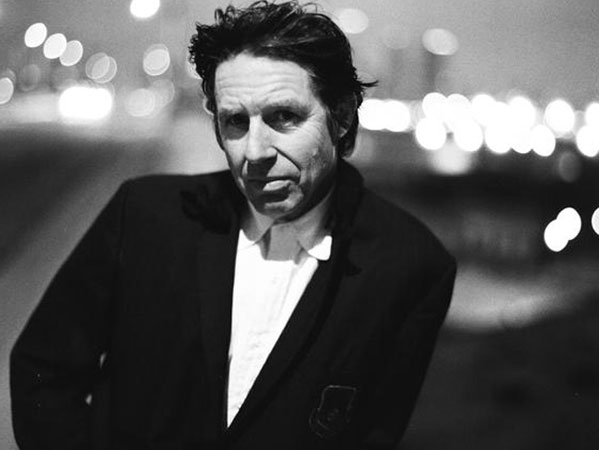To start with, rather than the cliché “Why a Christmas album?â€, I’ll go with the cliché “Why a live Christmas album?â€
For a number of reasons; obviously it’s a lot less expensive to record that way than having to go into the studio. Aside from that even, most of the Spankers’ recordings that we’ve released have been live recordings. There’s only been [recording] in the studio on two occasions, for Spanker Madness and for Hot Lunch. Even our first CD release, Spanks for the Memories, although it wasn’t recorded in front of a live audience, it was recorded essentially live around one microphone. We’re just real comfortable recording like that. So much of what the Spankers do is the live experience, and hopefully that comes across a little better in a live recording than it does in a studio recording.
You’re more comfortable in that setting than going into a studio and dealing with amplifiers and mikes and all that stuff?
It’s not that the studio intimidates us. It is wonderful to be able to go into that studio, especially we did do so many live recordings, to be able to take that time and overdub some vocals and get everything the way we want it, it’s a luxury that you don’t have when you’re recording live. I guess it’s just that we are comfortable recording live, and I don’t know how many bands are comfortable doing that, but for us it’s kind of old hat.
Why only the one original Wammo tune? Why not some more typical Spankers’ out-there sort of humor for the Christmas songs?
I don’t know. Maybe because it’s a slightly more reverent subject? I don’t know. It’s not something I would automatically think about—if someone told me I had to I could probably write a Christmas song, or a holiday song, but I just don’t think that the subject matter is something that inspired us to write a slew of Christmas songs. I don’t know if the world needs more Christmas songs! (laughs)
So when the idea to do the album, there was never really a question of, “Let’s write something original for it,†it was more “Let’s just pick our favorite tunes and do those�
I don’t even know that it was ever really conscious. From my side, I was personally just concentrating on finding tunes in that genre that I liked to do. I like singing other people’s songs, you know? (laughs) I don’t have to write all my own songs and only perform those. Wammo’s been going through a lot of that in the last couple of years, where he doesn’t really like singing other people’s songs anymore, he wants to do all his own stuff. But I still say there’s a lot of fun to be had in taking a song that you know and breathing your own life into it. I really enjoy doing that.
Were there any songs that didn’t make it into the album or into the shows that you would like to do for the Christmas project?
There was a couple things that didn’t make it onto the record. We did a version of the Pogues’ “Christmas in New York.†There’s something about it, I think was just … it didn’t make it on the record. (laughs) I don’t know; I think part of it was we didn’t feel we were doing the song justice, and there was another glitch in that every live recording we had of it had something wrong with it, to the point, you know, that it just didn’t make it on.
I think we did a lot of cool songs, we found some other cool songs in the process that we didn’t end up recording for one reason or another. I think there was a song that we discovered and thought, “God, what a great song, this is so great, I can’t believe I haven’t heard anybody do it,†and then found out shortly afterward that the Squirrel Nut Zippers had, in fact, covered that song for their Christmas record. So we were like, “Well, you know, we don’t really need to follow that up.†So, you know, it’s a pretty natural process for finding tunes we like.
It’s pretty much the album you intended to do from the start?
Yeah, I think so. It’s just another theme record for us, and we’re pretty familiar with that.
To get back to songwriting: where I first came to notice you guys was with Hot Lunch, which I believe was all originals.
I think it’s got a couple covers on it, but it’s mostly originals, yeah. And Spanker Madness was the next record and that’s all original with the exception of one song, but that had been in the Spankers’ repertoire for many years so we kind of felt obligated to get it down. (laughs)
So, given that this band is so big, and so fluid in its membership, how do you “assign†the songwriting duties? Do you write when you know you have an album due, or do songs just accumulate?
It’s a little bit of everything, really. Wammo and I are the principle songwriters, and Stanley Smith and other people in the band in previous years also wrote, so we’ve always had a lot of songwriters in this band. The songwriting process I guess is unique to each individual and it’s also unique in each situation, how it comes into the band. When we recorded Spanker Madness we set out a goal of each person to write a couple of reefer tunes. When we had enough work to do an EP – originally we were going to do an EP – I think the subject was so inspirational to some of us (laughs) that we ended up with more songs. We said, “Well let’s make this a full-length record,†and I had to go back and write two more reefer tunes. So I ended up writing four and Wammo ended up writing three, and then Stanley wrote one and Korey [Simeone] wrote one and Guy [Forsyth] wrote a couple, so we did have a lot of input there.
We do write sometimes when we know we’re going into the studio and we have a purpose in mind. But a lot of times songs accumulate. We all live so spread-out that when we get together it’s usually at the start of a tour, and that’s the time when the new material gets worked up. “OK, I wrote a couple songs between this tour and the last one, we need to get ‘em going.†So it’s a little bit of everything really.
Does stuff ever come out of improvisation or stuff you just toss out at rehearsal?
Yeah, it certainly does. We’ve had songs that were entirely improv’ed. We have songs that we did on a lark and ended up being our most popular songs.
Was “Hot Lunch†one of those?
No, I think that was a piece that Leroy [Biller] and Eamonn [McLaughlin] – Leroy being our guitar player, and Eamonn being the violin player – they got together and specifically wrote that. And that’s just another example of someone in the band who’s not a singer, another collaboration. So there’s a lot of creativity in this band, there always has been, even as the members come and go.
We get our material from a lot of different inspirations, and it comes together in a lot of different ways. Wammo and I just wrote a song recently that—we joked about writing a country song, a ballad with the catchline “If you love me you’d sleep on the wet spot.†It was a running joke for a couple years, and I finally wrote it down to a melody and wrote the bridge, and then we got together and wrote a verse, and then I think six months later we got together and wrote another verse and a bridge (laughs), and it was just this evolving process where the song is finally ready.
Is it difficult to be in a band with, as you said, so many people that come and go? Are you and Wammo kind of “in charge†when all is said and done?
I guess what it comes down to is it’s not exactly a democracy, but as far as decisions about people coming into and leaving the band, we try to involve as much as input from other people in the band as we possibly can. At any given time in the Spankers, there’s Wammo and I, who’ve been here all along, we’re in our eighth year, and Stanley, who’s been with us almost since the very beginning. And then there might be someone in the band who’s only been with us for three months, or six months or a year. So you can’t really have a true democracy where you put everything to the vote when you have the varying levels of seniority. Certainly [with] major decisions I at least like to get input from the other people; these are the people that you have to work with, and we like to have kind of a feeling of family and for everybody to feel like they have some kind of say and involvement in what goes on.
I noticed that Pops Bayless isn’t on the Christmas record. Is he away for good?
Pops Bayless hasn’t been in the band for a couple years now. He was on Spanker Madness; he quit the band before we’d even mixed the few songs that we had. It was after he left that we decided to turn the EP into a full-length, so we had two different sessions for that record, and if you look at that record there’s two different bass players on it. (laughs) One did the first session and one did the second session, and I think each session produced five or six songs. We actually ended up cutting one of Pops Bayless’s songs because he quit in the middle of it all. It was the first time that the split from the band wasn’t the most amicable one (laughs), so we did cut one of the songs he’d written and sung on the album, and I think he does a banjo track here and there. Nothing real major, but his name is still credited on that record although he’s just playing a rhythm instrument or two on a couple tracks. Him and Mysterious John quit at the same time, and they have another band in Austin now called Shorty Long, and that’s what they’ve been doing for the last couple years.
Continue reading →

